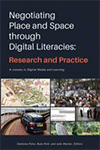
Negotiating Place and Space through Digital Literacies
Research and Practice
Edited by:
Damiana G. Pyles, Appalachian State University
Ryan M. Rish, University at Buffalo
Julie Warner, Independent Researcher
A volume in the series: Digital Media and Learning. Editor(s): Danielle Herro, Clemson University. Remi Kalir, University of Colorado, Denver.
Published 2019
Digital literacy practices have often been celebrated as means of transcending the constraints of the physical world through the production of new social spaces. At the same time, literacy researchers and educators are coming to understand all the ways that place matters. This volume, with contributors from across the globe, considers how space/place, identities, and the role of digital literacies create opportunities for individuals and communities to negotiate living, being, and learning together with and through digital media.
The chapters in this volume consider how social, cultural, historical, and political literacies are brought to bear on a range of places that traverse the urban, rural, and suburban/exurban, with emphasis placed on the ways digital technology is used to create identities and do work within social, digital, and material worlds. This includes agentive work in digital literacies from a variety of identities or subjectivities that disrupt metronormativity, urban centrism (and other -isms) on the way to more authentic engagement with their communities and others. Featuring instances of research and practice across intersections of differences (including, but not limited to race, class, gender, sexuality, ability, and language) and places, the contributions in this volume demonstrate the ways that digital literacies hold educative potential.
CONTENTS
Foreword, Kathy Mills. Preface. RECONSIDERING DIGITAL LITERACIES FROM THE EDGES. Digital media explorations: How space and identity become sources of learning, Scott Sikkema, Louanne Smolin, Joseph Spilberg, Mark Diaz, and Erin A. Preston. Mediating dialogue in public affinity spaces, Chuck Jurich. Queering text: Literacies surrounding cyber trolling, Matthew Thomas-Reid. Lifting the veil: Social loafing and participatory learning in networked space, Greg Neal and Mark Vicars. Translanguaging as a (meta)cognitive tool for navigating and learning in the online environment, Kwangok Song, Byeong-Young Cho. DIGITAL LITERACIES FROM WITHIN. Full of sound and fury: Rural students’ use of digital literacies in exploring space, place, and identity, David Bruce, Sunshine Sullivan, Nichole Barrett, Charles Gonzalez. Complicating problematic narratives about Southern people and places through counter-storytelling, Sean P. Connors, Erin Daugherty. Indigenous activism in the digital sphere: A transrhetorical analysis of the “Save the Longhorn Mountain” Facebook page, Jordan Paige Woodward. From the screen to the streets: Translating digital engagement into performance practice to facilitate multiple contributions to place making, Wayne Steven Jackson. Innovative technologies in support of local heritage management. Investigating the affordances of GIS, location-based applications and 3D reconstructions for the Ecomuseo della Via Appia in Latiano, Italy, Mark Opmeer, Gert-Jan Burgers, Rosanne Bruinsma, Ron Janssen, Christian Napolitano, and Ilaria Ricci. TRACING LITERACIES ACROSS TIME AND SPACE. (Im)Mobilizing literacies: Collisions of difference during the Digital Dialogue Project, Julie Rust. “Adolescents in the wild”: Critiquing and arguing back through mediated social spaces, Jane Saunders. Immateriality Redux: Tacit modalities and personal meaning across timescales, Sandra Schamroth Abrams and Jennifer Rowsell. Repatriating desaparacidos across time and space, Suriati Abas. The virtual carrels: (Re)thinking space(s) for professional development, Beth Buchholz, Sarah Vander Zanden, Nicholas Husbye, Christy Wessel Powell, Julie Rust.
REVIEWS
"Edited by Pyles (Appalachian State Univ.), Rish (SUNY, Buffalo), and Warner, an independent scholar—early-career researchers working in southern regions and/or rural communities in the US—this text examines the spatial turn: the “fundamental realization that all space is socially produced.†Articles include digital media explorations through media-artsintegrated curriculum by the Chicago Arts Partnerships in Education, mediating dialogue in Talkbass (a virtual affinity space for people who play the bass guitar), the use of cyber-trolls to mediate virtual conversations on queering text, social loafing online in a global collaboration project through "throwntogetherness" in a 24/7 digital literacy landscape, and "translanguaging" strategies to learn across online languages and culture. Other articles describe student uses of digital literacies to examine their personal and rural communal identities, "counterstorytelling" about southern peoples and places, indigenous activism in the digital sphere, online and street place attachments in Hull (the 2017 UK City of Culture), and the creation of an ecomuseum for Latiano, Italy. The text concludes with discussions on overcoming immobilizing literacies, the #besomebody project for student aspirations, tacit modalities for meaning making, Argentinian social imaginaries of self and other, and virtual carrels for "scholarly-ness."" D. L. Stoloff Eastern Connecticut State University in Choice Connect (Read full review)
-
Paperback9781641134835
Web price: $45.04 (Reg. 52.99)
-
Hardcover9781641134842
Web price: $80.74 (Reg. 94.99)
- eBook9781641134859

- EDU021000 - EDUCATION: Non-Formal Education
- TEC066000 - TECHNOLOGY & ENGINEERING: Research
- EDU029000 - EDUCATION: TEACHING METHODS & MATERIALS: General
-
 Cultivating Democratic Literacy Through the Arts
Guiding Preservice Teachers Towards Innovative Learning Spaces in ELA Classrooms
Cultivating Democratic Literacy Through the Arts
Guiding Preservice Teachers Towards Innovative Learning Spaces in ELA Classrooms
-
 Effective Alternative Assessment Practices in Higher Education
Effective Alternative Assessment Practices in Higher Education
-
 Frameworks for Integrated Project-Based Instruction in STEM Disciplines
Frameworks for Integrated Project-Based Instruction in STEM Disciplines
-
 Mobile Learning
Perspectives on Practice and Policy
Mobile Learning
Perspectives on Practice and Policy
-
 Quarterly Review of Distance Education
Volume 24 #1
Quarterly Review of Distance Education
Volume 24 #1
-
 Supporting Leaders for School Improvement Through Self-Care and Wellbeing
Supporting Leaders for School Improvement Through Self-Care and Wellbeing
-
 Using Mobiles in Early Childhood and Elementary Settings
Using Mobiles in Early Childhood and Elementary Settings

